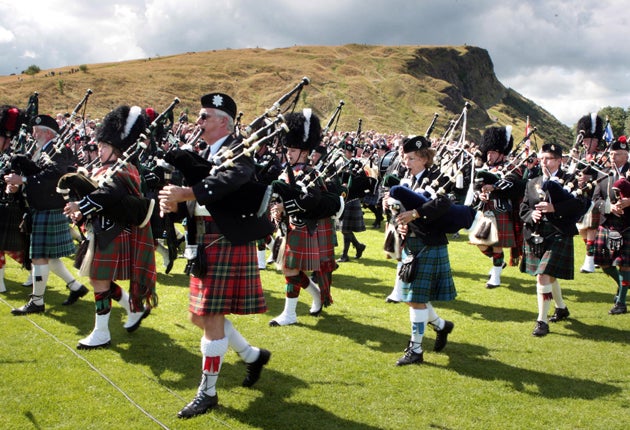Edinburgh sees the largest ever gathering of clan chiefs
Thousands come together from around the world to celebrate their heritage

They came in all shapes and sizes, a trail of tartan kilts weaving their way through Edinburgh's historic streets to the sound of the bagpipes. For many American pilgrims at yesterday's gathering, it was the first time they had visited their ancestral homeland.
And while clan activity has been dying out in Scotland, the Highland Games event in Edinburgh this weekend was a chance to welcome the burgeoning clans from across the world – and to mark a resurgence in national pride at home.
Although there had been a decline in the popularity of traditional Scottish games and heritage on home soil, the opposite is true abroad. North America alone has 100,000 clan members and holds 300 Highland Games each year. Many US visitors are expected to take advantage of the chance to research clan histories and genealogy.
Organisers said they decided to hold the Gathering 2009, opened yesterday by Prince Charles, partly to celebrate what Scotland has given the world but also to mark the 250th birthday of its favourite son, the poet Robert Burns.
Prince Charles said the gathering was a "stirring meeting of Scotland's history and its living heritage". It celebrated the "diversity of backgrounds, experience and occupations" of modern clan chiefs, he said. "Thankfully, in 2009 the lives of the clan chiefs and their clansmen, both in Scotland and abroad, are somewhat less blood-soaked and unhappy than those experienced by thousands of their ancestors. I happen to believe that it is Scotland's traditions of writing, language, speech, music and poetry which will continue to nourish this and future generations."
The two-day event will attract an estimated 50,000 people and representatives from 125 clans, and is the centrepiece of Homecoming Scotland, a celebration of all things Scottish and the focal point of a year-long calendar of events. Golf, whisky and the national dish of haggis are all commemorated as part of the nation's contribution to the world. There is also a highland fling competition as well as a heavy events championship featuring caber tossing.
It is the first time in recorded history that more than 100 of Scotland's clan chiefs have assembled in one place and the first time since Sir Walter Scott's Royal Pageant in 1822 that so many clans have been seen together in the city. Kitted out in perhaps the world's best-known national dress, the clans are meeting to discuss the future of the clan system in the 21st century and the role of the clan chief.
Celebrations will also feature talks on Scotland's historical greats, including the industrialist and philanthropist Andrew Carnegie and the designer Charles Rennie Mackintosh. Jamie Sempill, director of the Gathering 2009, said it was a "great honour" for the event to have Prince Charles, who is also known in Scotland as the Duke of Rothesay and the Lord of the Isles, as patron.
In a speech that paid tribute to the royal connection the historical Highland Games hold, stretching back to Queen Victoria, he described the prince as "the chief of chiefs". "His presence will mean so much to all those who have travelled from overseas to take part in this unique gathering. It is important to remember that the renaissance of clan gatherings can largely be attributed to Queen Victoria's patronage and her love of the Highlands with all its traditions."
Join our commenting forum
Join thought-provoking conversations, follow other Independent readers and see their replies
Comments
Bookmark popover
Removed from bookmarks